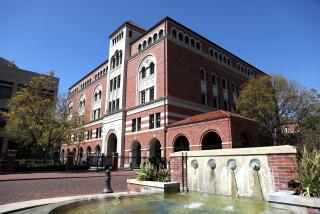Superior Court Judge Removed From Gay Discrimination Case
- Share via
SANTA ANA — A state appeals court has taken the unusual step of removing an Orange County Superior Court judge from a case involving a commercial photographer who refused to include a picture of a gay man and his male companion in a high school reunion yearbook.
The 4th District Court of Appeal ordered that Judge David H. Brickner be taken off the case after he declined to follow the appeals court’s instruction to award attorney’s fees to the man, stage actor David Engel of Los Angeles.
The decision marked the third time that the appeals court has reversed Brickner in the discrimination case, originally filed more than a decade ago.
Ordering that Engel’s attorney’s fees should now be determined by “a judge other than the judge who tried this matter,” Justice Sheila Prell Sonenshine complained that the plaintiff and the appeals court “have invested far too much time in a matter that should have long ago been finished.”
The panel’s action was unusual because judges are rarely removed from their assigned cases.
*
The unanimous opinion by the three-judge panel in Santa Ana holds that a plaintiff who wins a discrimination suit under California’s civil rights laws is entitled to have his attorney’s fees paid by the wrongdoer.
Gloria Allred, an attorney for Engel, who has appeared in “Forever Plaid” and numerous other stage productions, applauded the panel’s ruling.
“It’s an extremely significant decision. People whose civil rights have been violated should find it easier to find a lawyer to represent them because wrongdoers will be liable,” Allred said.
David Llewellyn, an attorney for photographer Dan Worthington of Costa Mesa, said he will appeal the court’s ruling to the California Supreme Court.
“This court of appeal is driven by ideology, not by law,” Llewellyn said. “It’s an abuse . . . for them to continue to litigate this matter.”
*
The decision to appeal means there is little hope for a quick final resolution to the case, which turned into a game of legal pingpong shortly after Engel filed his suit in 1987.
Engel claimed that Worthington’s photography company agreed to take portraits of alumni for a memory book but refused to include Engel and his partner, Eric Underwood.
Worthington said he had a policy against taking pictures of same-sex couples because it would violate his beliefs and cost him advertising revenue. When the school’s reunion committee objected, saying all alumni had been promised portraits, Worthington decided not to produce the souvenir book.
After a trial without a jury, Brickner dismissed Engel’s suit, saying that Worthington had shown no intent to discriminate and had stated valid reasons for his policy.
But a panel of the Santa Ana appeals court ruled in October 1993 that Worthington was guilty of discrimination because his decision was based on the sex of Engel’s partner. The photographer’s action therefore violated the state’s Unruh Civil Rights Act, Sonenshine said in the first appeals court ruling in the case.
*
In February 1994, the California Supreme Court erased that opinion from the state’s law books by ordering it “depublished” but left the ruling against Worthington intact.
Brickner was later ordered to determine how much money Engel should receive for damages and attorney’s fees.
Engel subsequently accepted a $250 damages payment from the photographer, but Brickner rejected the actor’s request for $83,000 in attorney’s fees and costs.
Engel was not entitled to any attorney’s fees, Brickner said, because the law provided reimbursement only for attorneys who presented “meritorious constitutional claims affecting large numbers of people.”
But in her latest ruling, Sonenshine said Brickner’s interpretation “ignores the plain language of the [law].”
“We note Engel may well be entitled to every penny of the requested fees award,” Sonenshine said. “He has spent the last 10 years seeking to enforce a [legal] right. To deny him the full amount . . . would be tantamount to finding the fees were unreasonable, some of his efforts unwarranted, or his goal unworthy.”
Sonenshine, who also wrote the latest opinion, described Engel’s request for attorney’s fees as “a case of first impression.” The opinion was certified for publication, meaning it could be cited as precedent in similar cases.
More to Read
Sign up for Essential California
The most important California stories and recommendations in your inbox every morning.
You may occasionally receive promotional content from the Los Angeles Times.













